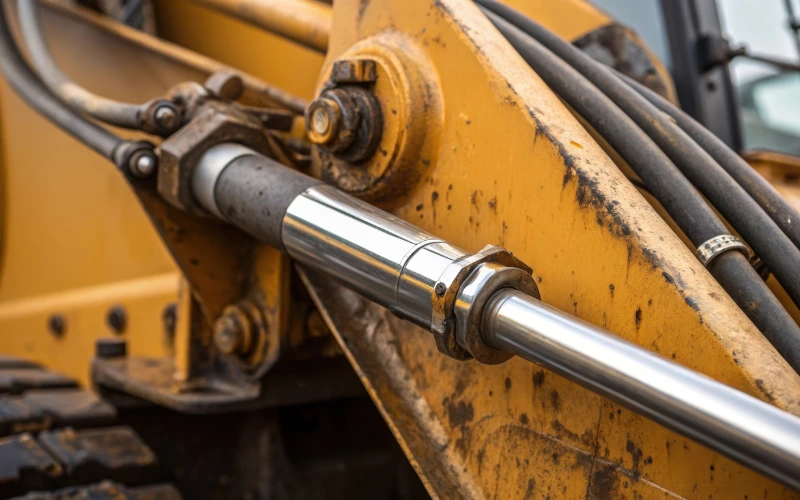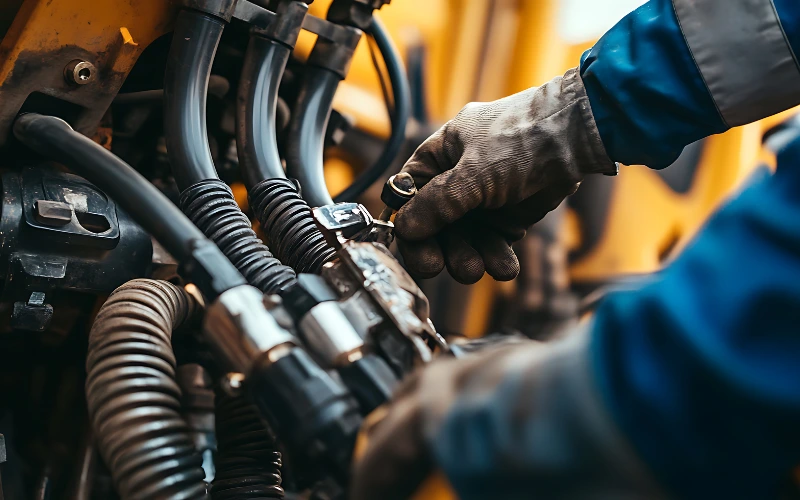Extending the lifespan of excavators and heavy-duty machinery
02 Oct 2025

Essential for construction, mining, and landscaping, excavators can achieve productivity levels of 108 m3 per hour. Not only that, they can save 165 hours on a single project, making them an invaluable piece of equipment. However, irregular maintenance can lead to unplanned downtime and increased costs associated with project delays.
In this article, we’ll explore common issues associated with excavators and how you can avoid them with a robust lubrication strategy.
The most common excavator issues
Excavators have an average lifespan of 7,000-10,000 operating hours, so during this time, it’s likely you’ll encounter some problems. If you’re overseeing a fleet of heavy machinery, you may experience one or more of the following problems with your excavator.
1. Overheating hydraulic systems: The hydraulic systems can overheat due to fluid contamination, low fluid levels, exceeding the load capacity or using the wrong hydraulic fluid.
2. Premature wear of pins and bushings: Worn pins can affect bucket movement, while misalignment of the excavator's arm, boom or bucket can place too much stress on the bushings and pins.
3. Engine component failure: Component failure can be caused by poor operation, maintenance, overheating and fluid contamination.
4. Hydraulic pump damage: Debris, particles, water and air can contaminate fluid while mechanical wear and exceeding weight limits can all lead to hydraulic pump damage.
5. Track and undercarriage deterioration: Operating at high speeds, making sharp turns, operating on slopes and aggressive operation can all damage the tracks and undercarriage. Poor equipment maintenance and harsh environments can also contribute to damage.
6. Contaminated or degraded lubricants: Ignoring fluid change intervals, failing to top up and not checking lubricant health enough can lead to contaminated lubricants, which can damage your machinery.
These issues are often the result of, or are worsened by, poor lubrication practices. So, what can you do to avoid these failures that can lead to unplanned downtime and increased project costs?

Why effective lubrication matters
By neglecting a lubrication strategy, you could experience increased maintenance costs, unplanned downtime and reduced asset lifespan. Proper lubrication is not only essential for ensuring your excavator operates efficiently, but it can also prevent minor issues from turning into huge problems.
Reduces friction and wear
Lubrication reduces metal-to-metal contact by creating a thin film between moving parts. This can protect components like pins, bushings and gear teeth while also acting as a shock absorber and reducing noise.
Protects against corrosion and contaminants
Heavy-duty lubricants prevent water, oxygen, dirt, debris and other contaminants from reaching metal surfaces and causing corrosion, which can lead to equipment failures.
Maintains hydraulic system efficiency
Multigrade hydraulic fluids ensure optimal flow at varying temperatures, which keeps machinery clean and efficient. It can minimise energy loss from friction while leading to fewer breakdowns and reduced unplanned downtime.
Supports thermal regulation
Effective lubrication helps to prevent engine overheating by dispersing heat generated from mechanical operation. Lubricants can withstand extreme conditions because they have better thermal and oxidative stability.

4 lubrication tips for improving excavator uptime
To avoid unplanned downtime and improve the longevity of your equipment, here are 4 practical tips to keep your fleet of excavators operational for longer periods.
1. Use OEM-recommended lubricants
You should always consult your owner's manual and OEM recommendations. This helps avoid voiding your warranty and ensures you are using the highest quality lubricants to protect your excavator.
2. Implement a lubrication schedule
Your equipment manual should state recommended oil change and lubrication management intervals, so it’s important to stick to these to properly maintain your equipment. You will likely need to add or change lubricants at the following intervals, dependent on manufacturer recommendations:
Greasing pins and bushings: 6 - 48 hours
Engine oil changes: 250 - 1000 hours
Hydraulic oil changes: 2,000 - 5,000 hours
3. Monitor lubricant condition
By introducing a performance and preventative maintenance schedule, you can monitor the condition of lubricants more effectively and predict when lubricants can be topped up or changed more accurately. A lubrication maintenance partner, like Gulf CARE, can help you to analyse data about your equipment lubricants and work towards extending drain intervals.
4. Train operators and technicians
To ensure lubricant condition is monitored and maintained properly, you should ensure any operators and technicians are properly trained to collect lubricants for condition analysis and know how to top up lubricants too.

Using the right products for excavator reliability
Heavy-duty lubricants will offer the best protection for excavators working under extreme conditions with heavy loads. Lithium-based grease is recommended for heavy use for its versatility and reliability in lubricating bucket pins and bushes. Meanwhile, your engine and hydraulic oils should be chosen based on your manufacturer’s recommendations and the machinery's operating temperature.
Gulf CARE can assist with choosing the right Gulf lubricants for your machinery as well as assisting with ongoing fluid monitoring and maintenance.
Your lubrication strategy, or lack of, directly affects the overall performance and longevity of your excavator. To minimise issues with your excavator, using the right lubrication, as recommended by your machinery manufacturer, sticking to drain and service intervals and introducing a predictive maintenance strategy all contribute towards extending the lifespan of your excavator and reducing unplanned downtime.
Evaluate your current excavator lubrication strategy and explore Gulf Oil’s range of industrial lubricants now.

